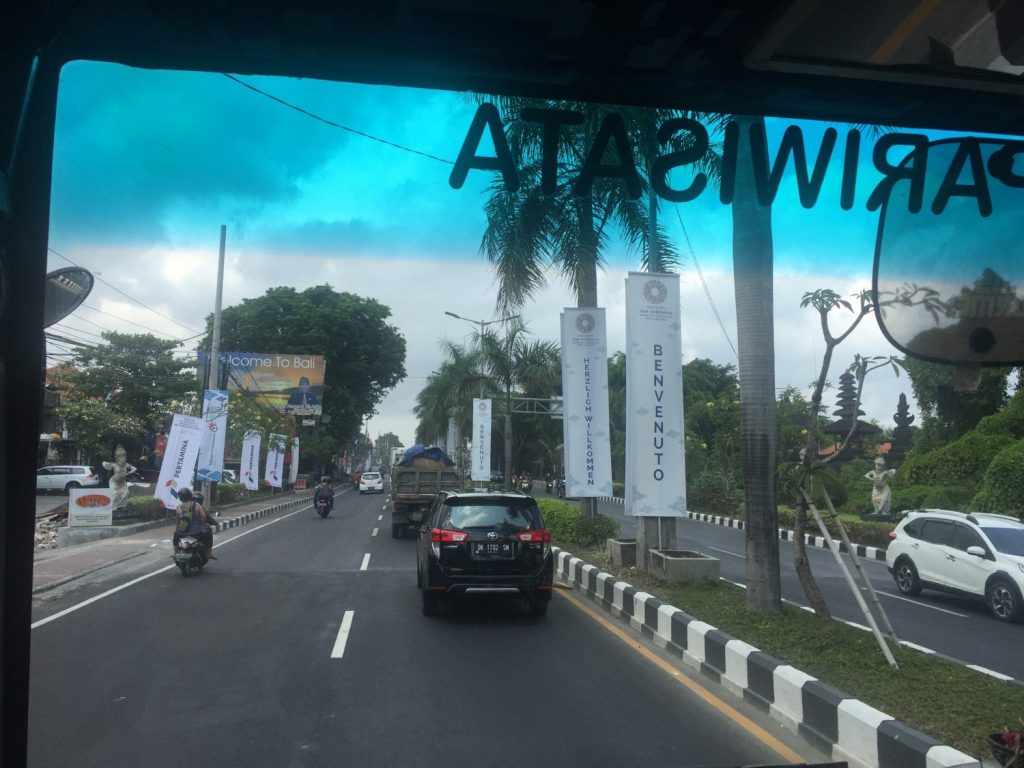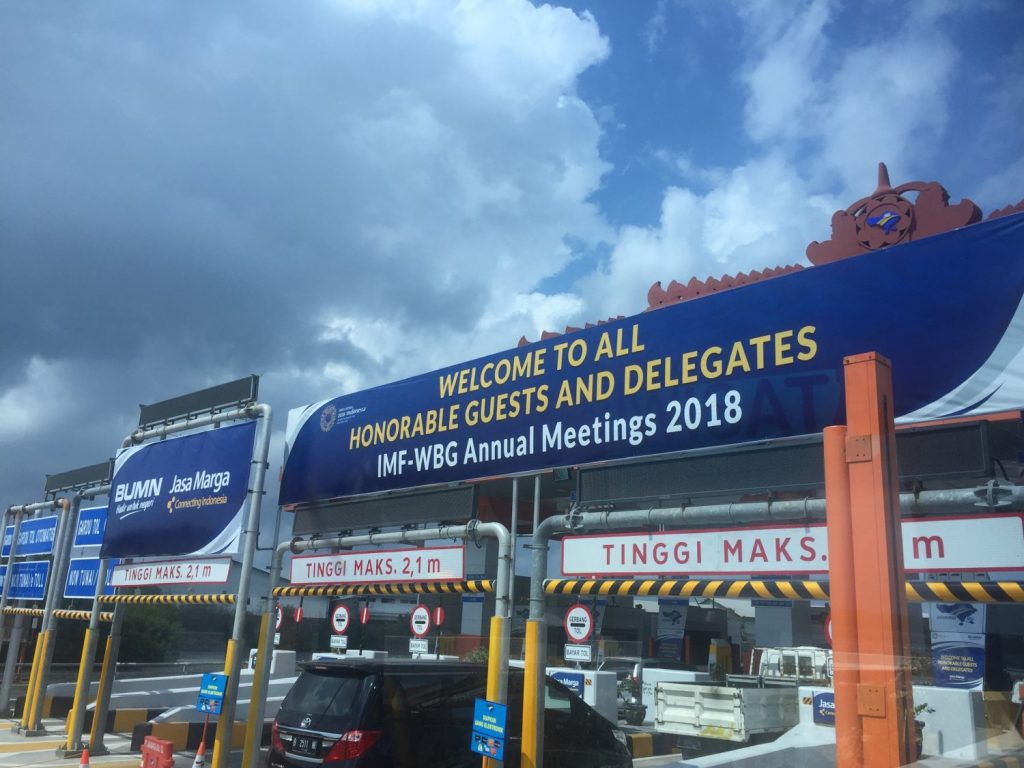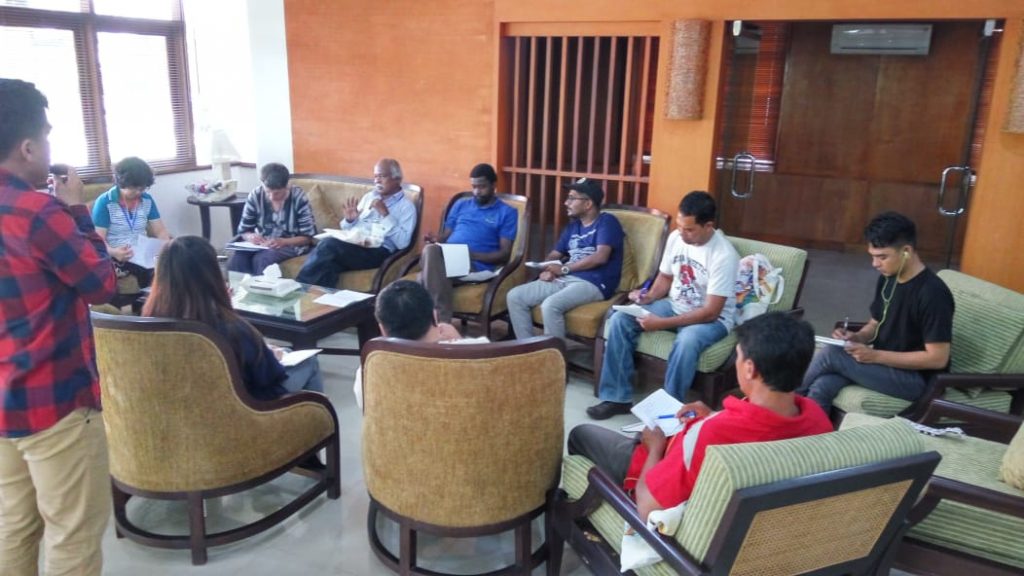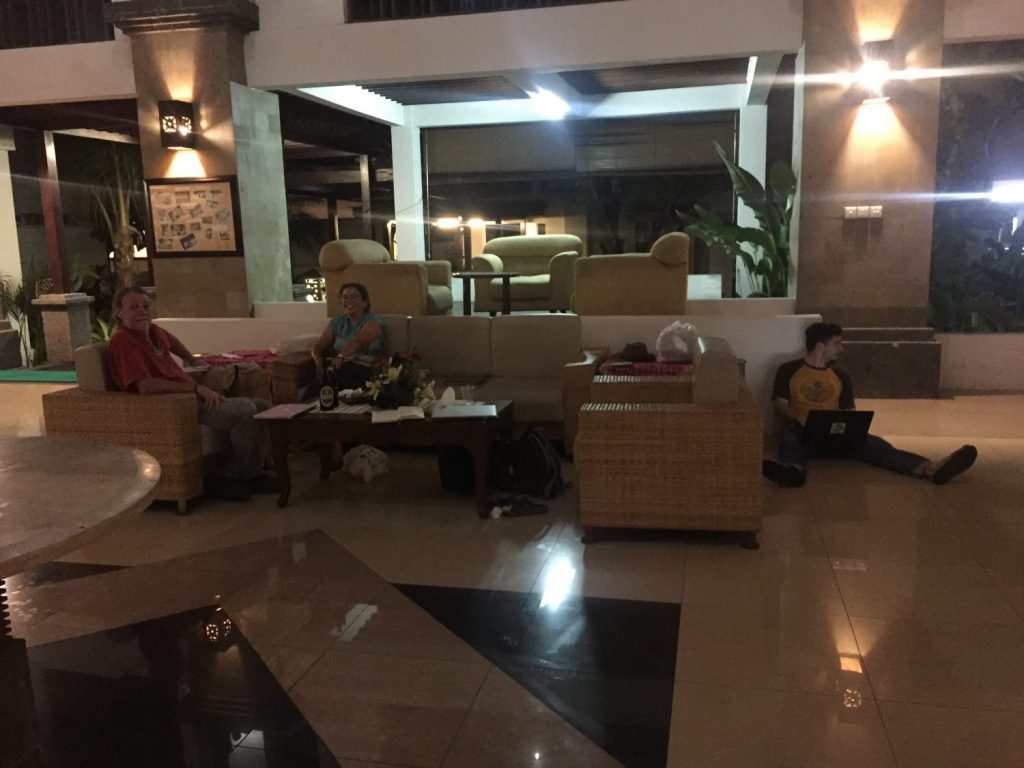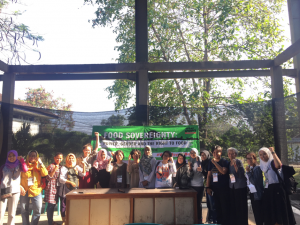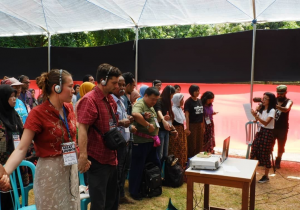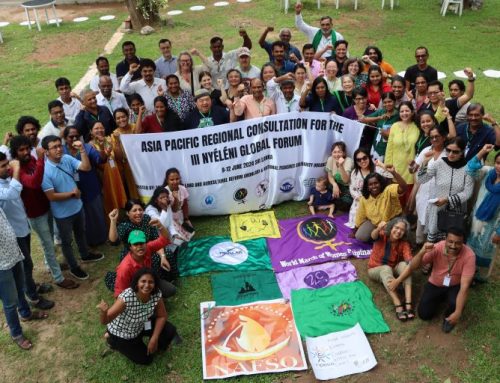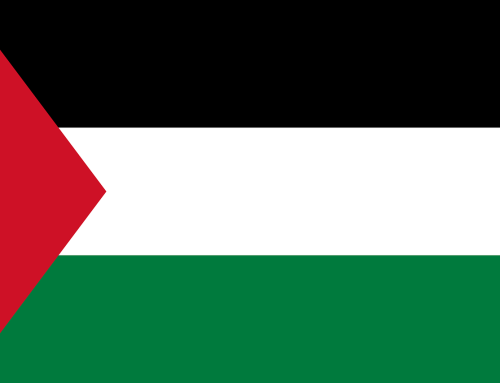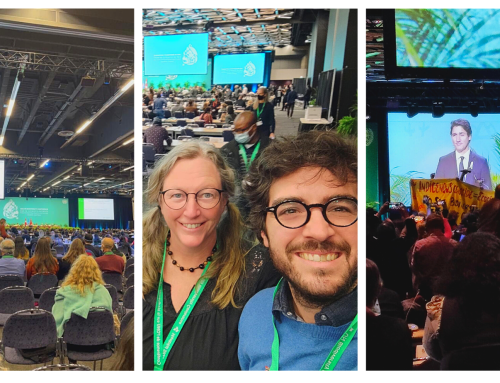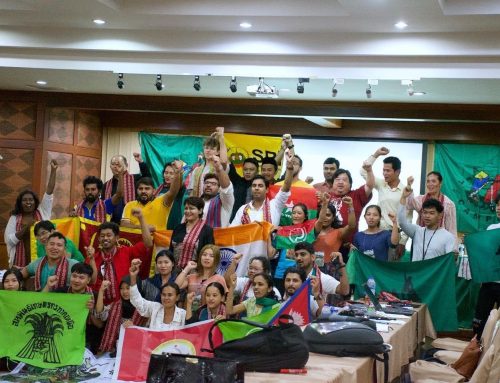Regional Meeting for Asia of the Land and Territory Working Group of the International Planning Committee for Food Sovereignty: AFSA Report
8-14 October 2018
Sarah de Wit
This report aims to:
- Report back on the meetings, workshops and direct actions relating to progress of the food sovereignty movement.
- Report back on the IMF/WB agenda in Bali.
- Explain and reinforce understanding of AFSA’s membership with IPC and its Asia Pacific Regional Committee.
- Refer to the history of IPC and the Working Group on Land and Territories and AFSA’s involvement to date.
- Provide members of AFSA transparency regarding funding for the trip.
- To give AFSA supporters the knowledge to fully understand the context of these meetings in order to solidify AFSA’s organisational priorities and to encourage the food sovereignty movement in Australia to cohere and work together more effectively and with better opportunity for democratic participation.
Background
Stepping out of my usual role as Paralegal for AFSA, from 8th – 14th October this year I attended regional meetings for the Asian Land and Territory Working Group of the International Planning Committee (IPC) for Food Sovereignty in Bali, after being nominated by the AFSA Committee to represent our organisation and our members.
AFSA has been an active member of the IPC for Food Sovereignty for five years. As part of the Regional Facilitating Committee for Asia Pacific since 2016, AFSA was invited to attend the regional meetings as well as workshops and political actions that followed.
I had the opportunity to participate as a delegate for IPC Asia and to receive a funded spot within the IPC budget. This meant that AFSA did not cover my international travel costs and expenses. The IPC designates interested delegates by prioritising geographical, gender and constituency representation, such as youth, women or indigenous people. While I am not a farmer or rural dweller, as a young woman I was empowered to attend because of the composition criteria of the IPC Working Group.
The Meeting for the Land and Territories Working Group
Corresponding the International Monetary Fund (IMF) and World Bank Group Annual Meetings [1] in Bali from 8th – 14th October 2018, the meetings were called by the IPC Working Group for Land and Territories[2] to bring together peasant organisations from across the region to defend food sovereignty and the rights of peasants.[3]
This followed a call from La Via Campesina to mobilise for the International Day of Action against WTO and Free Trade Agreements on 10th September 2018. The meetings and workshops were also held before 16th October, the International Day of Action for Peoples’ Food Sovereignty and against Transnational corporations.
On the way to our hotel, I saw countless flags branded with the IMF and World Bank meeting logo lining the streets. Each flag featured the word “welcome” in different languages, welcoming finance ministers and central bank governors from more than 180 countries to Bali. My taxi driver told me that there would be 30,000 individuals travelling to Bali for the IMF World Bank meetings. A new toll had been set up to finance upgrades to the roads between the airport and Nusa Dua, in preparation for the meetings. I was astounded to hear that the Indonesian government had spent more than $75 million to host the three-day IMF and World Bank meetings, especially after the tsunami and earthquake incidents in Sulawesi had happened a mere week before. I later learned from an ABC article that the Indonesian Opposition criticised the government for its hosting budget (which far exceeded that of previous host countries [4]) and called for money to be diverted to earthquake victims in the cities of Palu and Donggala.
At the IPC meetings, delegates and participants from Asia and Australia as well as Africa, Americas and Europe, unanimously held the World Bank and IMF responsible for facilitating large-scale land grabbing, deforestation and ocean grabbing, which has led to increasing inequality, poverty and global hunger. The meetings were facilitated by Serikat Petani Indonesia (SPI), the Indonesian Peasant Union, a member of La Via Campesina and the IPC.
We discussed what strategic support we would expect from the IPC, what fields of work proposed by the IPC Working Group would support our struggles and, according to the priorities discussed, what plans of action we could commit to. After the presentation and approval of the agenda, we had a session on the IPC Land and Territory WG and its work plan, reviewing the 2017 WG meeting, presenting the WG and its working methods, and presenting the resolutions of the previous IPC general meeting. We also discussed the renewal of the coordination group and identified interested organisations in coordination. Discussions surrounded our response to peasant and advocate criminalisation, our communication strategy and the deepening of our vision of people’s governance according to the priorities that came out of our working groups.
The consensus among delegates was that the World Bank and IMF have taken control of the global food chain and placed it into the hands of agribusiness and development speculators, while creating devastating impacts on food production, rural people, markets and the ecosystems affected.
A Media Release by La Via Campesina (LVC), the international peasant’s movement, reported on the struggles of various countries according to their representatives, including Indonesia, Timor Leste, Thailand, Cambodia, Malaysia, South Korea, India, Nepal, Bangladesh and also allies from Kenya, France, Nicaragua, Germany and Argentina. Many cited the major factors contributing to the forced displacement and development of peasant communities by the World Bank and IMF.
For over three decades, the IMF and World Bank have “forced countries to decrease investment in food production and to reduce support for peasant and small farmers.” LVC also reported that, because of “neo-liberal policies, state managed food reserves have been considered too expensive and governments have been forced to reduce and privatise them under structural adjustment regimes.”
Ms Jeongyeol Kim from the Korean Women Peasants’ Association pointed out the impact of free trade agreements and export-oriented agribusiness models on women farmers.
“Peasant women face the worst of this industrial model, that is heavy on use of chemical inputs. This shift in the way we do agriculture came about largely due to conditions put forth by IMF and World Bank while giving loans.”
Baramee Chairayat from Assembly of the Poor, Thailand said:
“The National Development Plan in Thailand always had the blessing of World Bank and it meant that agricultural land and public forests were being diverted to make way for massive highways, large agribusiness plantations and sugar cane factories. Over a period of four decades much of rural Thailand has become landless. They have enacted laws that alienated indigenous peoples from their forest.”
Zainal Arifin Fuad, national peasant leader from SPI, said:
“World Bank and IMF have, in the name of Structural Adjustment Programme, pushed for financialisation and privatisation of natural resources in Indonesia. When people resist these land grabs – taking place whether in the name of REDD+ or any other such programs – peasants are attacked, jailed and criminalised. We have the most recent case of Ahmad Azhari, who was kept in prison for nearly 9 months for defending the rights of peasants. All these institutions are here to help corporations expand their businesses rather than lifting people out of poverty.”
AFSA shared solidarity with the movement by firstly stating Australia’s direct hand in contributing to free trade and export-oriented deals across the globe. As a country that voted against the recently adopted UN Declaration for the Rights of Peasants and Other People Working in Rural Areas, Australia is seen by many rural communities of Asia as one third of the “evil three” in the context of globalisation. During a working group discussion at the meeting, I stated that AFSA is working to build local, state and national government support for small-scale farming. I shared our successes in making planning permit applications cheaper and easier for small-scale farmers through our lobbying efforts. I also described the work of our Legal Defence Fund (LDF) which has in its first year supported farmers with their planning permits, given advice about alternative milk supply chains, responded to spray drift concerns in the urban and rural context, and made nearly a dozen law reform submissions to state and national governments relating to food and agriculture regulations. I also talked about the significant loss of farmland to peri-urban growth, and due to roads and infrastructure development and the increasing expansion of large-scale, concentrated farming methods.
I was asked to expand on the concerns of indigenous peoples within Australia for control over land, water and seeds. While I could not represent the voice of Aboriginal people, I touched on the impact of the intellectual property regime in relation to native foods and the expression of Aboriginal culture. AFSA has strategised over these issues, significantly since Bruce Pascoe spoke at our 2017 Convergence, which had a major impact on our work for food sovereignty in Australia.
We hope the IPC Working Group on Land and Territories will continue to open regional spaces for policy discussion and strengthen relationships between social movements. The IPC’s contribution to formulating the Declaration for the Rights of Peasants will further validate the experiences of small-scale farming in Australia. In turn, small-scale farmers are to enjoy newly formed rights given to them by way of being captured under the definition of “peasant” in that Declaration[5]. I committed at that time, on behalf of AFSA, to promote the legitimacy of the Declaration by lobbying to our national government and its departments.
After long hours of meetings and working groups, I spent evenings in the lobby of the hotel working with newfound friends and allies from India, Argentina, Germany and Nicaragua. We designated the lobby as “The Office” where we would share resources, work for our separate organisations, socialise and reflect on the meetings.
Workshops and Direct Actions
The Working Group also hosted a series of events with allies in Bali to protest against the neoliberalist agendas of the World Bank and IMF which promote free market trade regimes responsible for destroying rural peasant communities, fishers’ livelihoods and peasant markets.
Under the theme of “A World Beyond Banks”, the workshops enabled a broad assembly of peoples’ movements, indigenous peoples, peasants, fisherfolks, workers, migrants, women, youth, LGBTQI people and others adversely affected by the IMF and World Bank’s agenda to meet and strategise.
The event was organised and facilitated by Gerak Lawan, the Indonesian peoples’ movement against neo-colonialism and imperialism. The workshops included joint public forums on extractivism, monetisation, commodification, and infrastructure. We were fortunate to have the location provided by TVRI, the national broadcasting television network of Indonesia.
As we entered the TVRI auditorium, an open picture board was visible behind the registration table. The photos, showing the struggles of rural workers’ alliances, women peasants and many others against neoliberalism, were powerful to say the least.
Nged Khow from APWLD, Cambodia (Mrs Khow came to the workshops to talk about her campaign to save her farm. I was honoured to meet her and hold her hand as she shared her story with me through her interpreter).
These photos were eventually taken down by Gerak Lawan members to reduce the risk of the event being shut down by local police.
Women played a strong role in many aspects of the workshops. This is unsurprising as most of the world’s food is grown by peasant women [6]. I was personally inspired to see Indonesia’s women’s solidarity group, Solidaritas Perempuan and the Asia Pacific Forum on Women, Law and Development contributing significantly to the discussions and strategising for development justice for women. Women voices led most of the workshops, forums and direct-action preparation.
An entire working group session was dedicated to a gender discussion, “Food Sovereignty: Power Gender and Right to Food” on 12 October at the TVRI Auditorium. The speakers highlighted the failure of the IMF’s gender equality policies, where women empowerment is promoted by way of encouraging market-based solutions to market access. Instead of assisting women in the labour force to have control over their own land, the IMF maintains that women should set up their own bank accounts to access financial services in an increasingly precarious and deregulated market.
Among the speakers was Ms Kim from KWPA, an active member of the IPC and LVC.
I was impressed and motivated by the leadership shown by the feminist organisations present and their drive and motivation to carry out advocacy, activism and movement building. Their efforts significantly advance women’s human dignity and development justice in the region.
At the auditorium, we were also joined by grassroots organisations such as the Asia Peoples’ Movement on Debt and Development, Focus on the Global South, Fight Inequality Alliance, ReCommon, Indonesia Legal Aid Foundation, FTA Watch, World Forum of Fisher People, Peoples Coalition for Fisheries Justice (KIARA), Center for Financial Accountability, Bina Desa, Coalition for Human Rights in Development, IFI Watch Myanmar, OT Watch Mongolia, Oakland Institute, Centre for Research on Multinational Corporations (SOMO), Indonesia for Global Justice (IGJ), and many others.
The program for the workshops was designed to match the discussions being had at the IMF World Bank meetings themselves, canvassing issues relating to social justice, feminism, civil societies, the future of work, transparency and impunity of international financial institutions, and others.
Some effective protests were held around the Nusa Dua for reclamation of farmland and ocean territory. While arrests were made two days prior, quick legal assistance provided by Indonesian Legal Aid Foundation and Solidaritus Perempuan meant that the protesters were released without charges.
Disappointingly for many, the delegates of the regional meeting for IPC were not granted police approval for a public protest by this time and were unable to participate in direct action for safety reasons. Despite this, we supported the above grassroots organisations in stating truth to power in their objectives to the police when the TVRI was investigated on 14 October.
Action!
Delegates and peasant organisations have pledged to expose the incriminating role of World Bank and IMF in increasing inequality, land dispossession and poverty.
We agreed to continue to denounce the existence of World Bank, IMF and World Trade Organisation as well as expose the details of corporate agreements that threaten to take away people’s food sovereignty and allow expansion of markets for multinational agribusinesses.
AFSA agreed to write a letter to the Department of Foreign Affairs and Trade (DFAT) about our position on the forthcoming Australia/European Union Free Trade Agreement. While we have not received an update from DFAT about this agreement, we intend to work with our allies in Europe to draft this letter expressing our views towards the agreement. We will refer to the experiences of the delegates and peasant organisations at the meetings and workshops in Bali. On behalf of AFSA, I agreed to help promote the legitimacy of the Declaration of Peasants’ Rights in Australia by lobbying our national government and discussing this strategy with AFSA and its supporters at our annual Convergence.
La Via Campesina continues to denounce the impunity with which destructive policies are pushed forth by World Bank and IMF. As a member of LVC, AFSA will continue our campaigns for realising food sovereignty and freeing agriculture from trade negotiations.
You can read about the history of the Indonesian resistance to WTO/WB/IMF HERE.
If you’d like to see more photos of this meeting and the events surrounding it, you can see some HERE.
——————————————————————————————————————————
[1] The 2018 Annual Meetings of the International Monetary Fund (IMF) and the World Bank Group took place in Bali Nusa Dua, Indonesia, and were held between the Boards of Governors of the IMF and the World Bank Group. Central bankers, ministers of finance and development, parliamentarians, private sector executives, representatives from civil society organizations (progressively becoming key components in a global context often described as neoliberalisation) and academics were given a luxury business travel package to attend and discuss “issues of global concern, including the world economic outlook, poverty eradication, economic development, and aid effectiveness.” In addition to the meetings of the Boards of Governors, the Development Committee and the International Monetary and Financial Committee (IMFC) convened. [2] This Working Group is endorsed and has full support of the all the IPC organisations on a specific priority theme. They are open and flexible structures, formed on an ad hoc basis with an open working methodology. They work in coordination with the Facilitating Committee on issues relating to land, indigenous peoples, fisheries, livestock, agroecology, genetic resources and trade. It is supported by human rights organisations, Focus on the Global South and FIAN International. [3] According to the IPC Terms of Reference, the delegates formed an agenda for the meetings including discussions on each organisation or country’s regional priorities for food sovereignty and challenges regarding the control of natural resources (land, water, fisheries, forests). [4] The Indonesian Opposition, the Fair and Prosperous Coalition, argued that as a host of the IMF World Bank meetings, Indonesia is only required to provide venues, simple catering, and accommodation, yet the amount being spent far exceeds that of previous host countries. [5] Article 1.1 a peasant is any person who engages or who seeks to engage alone, or in association with others or as a community, in small-scale agricultural production for subsistence and/or for the market, and who relies significantly, though not necessarily exclusively, on family or household labour and other non-monetized ways of organizing labour, and who has a special dependency on and attachment to the land [6] Food and Agriculture Organisation, the Role of Women in Agriculture.<http://www.fao.org/docrep/013/am307e/am307e00.pdf>.

